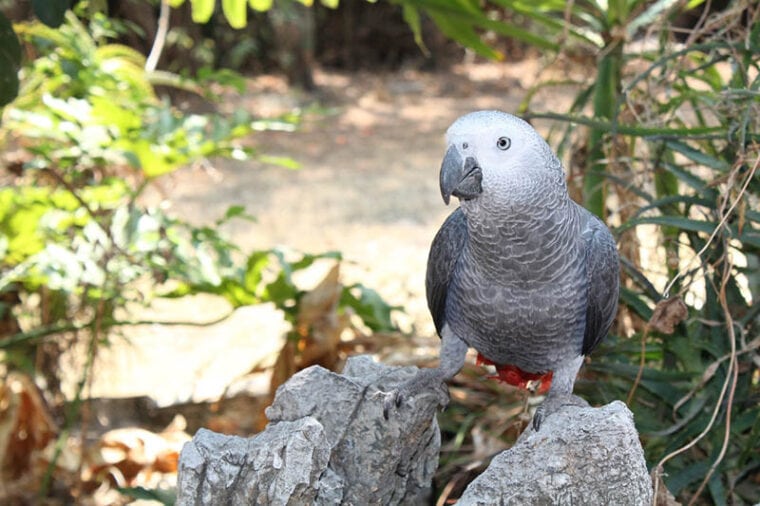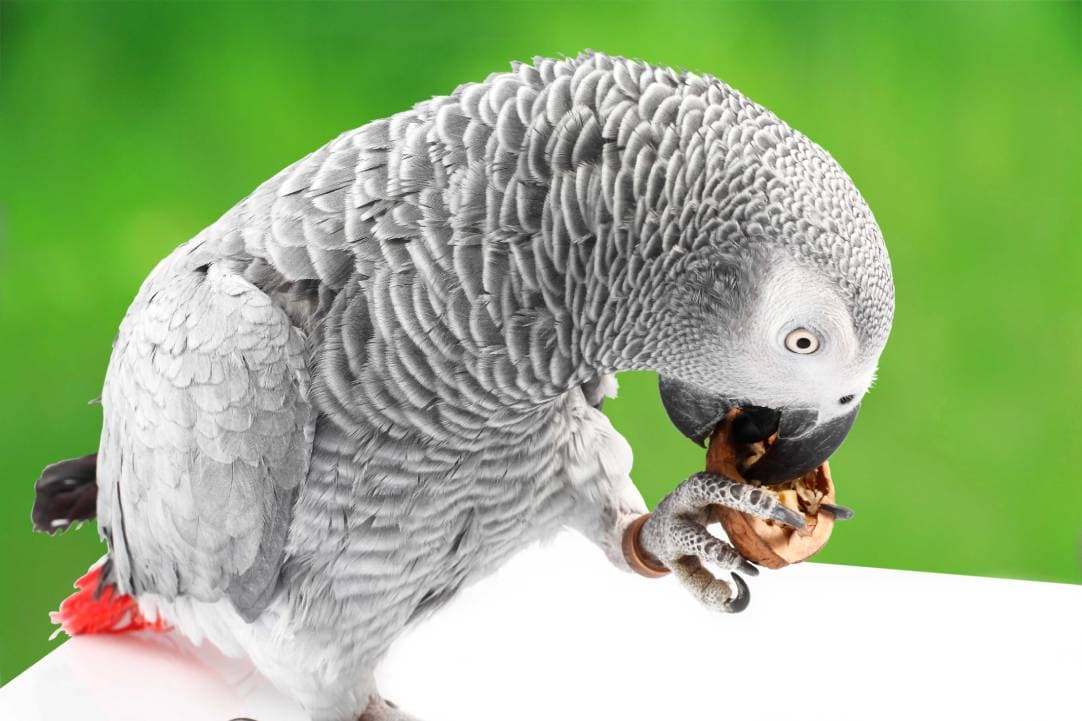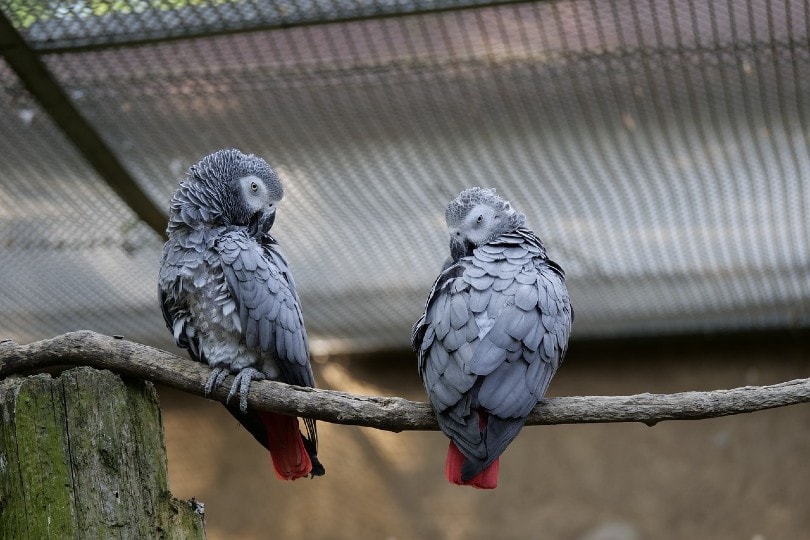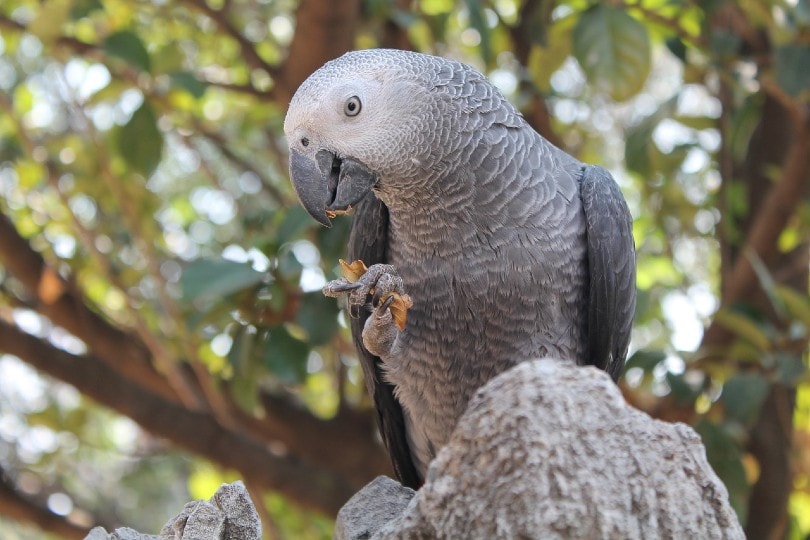
Click to Skip Ahead
Historically, African greys (Psittacus erithacus) are one of the most popular pet parrots. They’re highly intelligent and friendly and considered one of the best talking birds, with vocabularies consisting of hundreds of words. Their longevity was part of the reason their popularity initially boomed. Pet African grey parrots can live for 25–40 years on average. The maximum confirmed longevity record of a pet African grey parrot is just shy of 50 years (49.7 years).
Read on to learn everything you need to know about the average African Grey lifespan.
What’s the Average Lifespan of an African Grey Parrot?
African greys are listed as endangered according to the IUCN 1. Furthermore, the World Parrot Trust has called for attention to this species, as it is one of the most frequently illegally captured species 2, which is decimating their wild population 3. These parrots are among the most presented for behavior issues and have an extremely high sociability demand. The lack of proper amounts of socialization is associated with premature death in these parrots 4.
It is estimated that up to 40–60% of wild-caught animals die during the capture process. It is also estimated that up to 40% of African greys kept as pets develop various behavioral and health issues due to a lack of social and intellectual stimulation.
African greys should only be adopted by experienced avian keepers who can meet their needs as pets and are able to help use their pets for the conservation efforts of this species. At Pet Keen, we do not encourage adopting African grey parrots without ample research and thought. This article is intended for informative purposes only.
African grey parrots have a long lifespan. The confirmed age record of this species is just under 50 years 5. There are anecdotal but unverified claims of some pets living beyond this age. Several factors can influence the longevity of this beautiful bird.
How Long Do African Grey Parrots Live in the Wild?
Wild African grey parrots are highly social birds that live in large flocks. They occupy lowland forests, mangroves, savannahs, and rivers. They are primarily considered herbivorous (specifically frugivores). They usually feed primarily on nuts and fruits, supplemented with leafy matter, bark, and flowers.
The best estimation of a wild African grey’s lifespan is around 23 years on average. This conclusion was based on a study involving 120 birds.
How Long Do African Grey Parrots Live as Pets?
Most African greys kept as pets can live around 45 years or so on average.
Why Do Some African Grey Parrots Live Longer Than Others?
1. Nutrition

Nutrition is likely the number one influence in the lifespan of your pet parrot and where many well-meaning bird parents go wrong. Unfortunately, there is still much misinformation about the proper diet for African Greys. Many new bird owners believe their pets can thrive on seeds alone, but this is far from accurate.
While wild African greys will eat seeds if they find them in their habitat, they’re primarily frugivorous as they prefer fruits. Fruits have a high sugar content, providing the wild birds with the energy they need to thrive in their natural habitat. Wild African greys prefer fruits, but they’ll eat almost anything, including leaves, flowers, insects, and tree bark.
Your pet bird has different nutritional needs. The healthiest companion birds are fed a high-quality pellet diet to ensure they get a good balance of nutrients without the risk of a very high-calorie diet. Their diets also consist of colorful veggies and small amounts of fruit and seeds. Your African grey shouldn’t have unlimited access to fruits or seeds as they do not have the same energy needs as their wild counterparts.
2. Sociability, Emotional, and Intellectual Stimulation
African greys are very social birds, and they’re also considered extremely intelligent. Alex, a popular African grey, could identify seven colors, count up to six, and learned some of the alphabet. He also began learning to label objects from just photographs (so he could tell what object was depicted in a photo).
African greys that are not offered enough socialization as pets have been known to develop behavioral problems. The stress associated with isolation also leads to alterations to their physical health, and African greys that are socially deprived tend to live much shorter lives.
The healthiest pets are those that get at least 4-6 hours of socialization with their owners every day. Please note that this is a minimum requirement, not a maximum.
3. Environmental Conditions
African Greys have very sensitive respiratory systems and are highly intolerant to perfumes, aerosols, candles, cleaning products, and more. Many household items you use without giving it a second thought are incredibly toxic for birds.
Take Tetrafluoroethylene or Teflon, for example. This chemical coats cooking utensils and appliances for a non-stick effect. You can find Teflon in things like frying pans, self-cleaning ovens, pizza pans, coffee makers, irons, curling irons, portable heaters, and hair dryers. When these items are heated to a certain temperature, they release toxic particles and acidic gases that become toxic when inhaled. The gases are colorless and odorless and can cause sudden death in pet parrots.
Environmental conditions also include your pet’s enclosure. It is recommended that all parrots be allowed the opportunity to have a secure outdoor enclosure for at least a few months of the year (the spring and summer months), as sunlight is very important for their health. As these birds are social, they do better when housed with their conspecifics.

4. Routine Healthcare
Birds have an instinctive knack to mask their illness as long as possible. This is because they are prey, and appearing healthy may deter a predator from attempting to hunt them. This instinct is hardwired even in pet birds today.
African greys require routine veterinary care and wellness checkups to ensure that they’re in good health and that there are no health issues that warrant intervention. Pet parrots that receive such healthcare fare better than those that do not.
4. Healthcare
Captive birds may be more prone to certain conditions than their wild counterparts. Obesity is a silent killer of domestic birds because it’s hard to see what’s under all their feathers. Your pet will need to spend a good part of its day outside its cage to ensure it gets the exercise it needs to prevent excess weight gain.
Hypocalcemia is a common health condition for African Greys, causing serious side effects like seizures. It is most prevalent in birds that have primarily been fed an all-seed diet, so it’s much more common in captive birds than in wild ones. A proper diet, cuttlebone, and calcium block can help reduce the likelihood of your bird developing hypocalcemia.
The 6 Life Stages of an African Grey Parrot

1. Hatchling
African Greys are born with closed eyes, wobbly feet, and are void of feathers. They rely on their parents to regurgitate food for them.
2. Nestling
Parrots become nestlings when they open their eyes and imprint on their parents (or humans if no other parrots are nearby).
3. Fledgling
An African grey is considered a fledgling when they have left their nest. They are also often weaned at around this time.
4. Weanling
Young Greys will start feeding themselves and experimenting with different solids. They forage independently and develop the skills they need to care for themselves.
5. Juvenile
A juvenile African grey is a parrot that is fully independent from their parents but is not yet sexually mature.
6. Adulthood
An adult African grey is a fully mature bird that is able to mate with another bird of its species.
How to Tell Your African Grey Parrot’s Age
The only 100% accurate way to determine your pet’s age is to ask the breeder. Most breeders keep detailed records of the birds they’ve raised and can provide you with your bird’s hatch date.
An avian vet should be your next point of contact. Most vets specializing in exotic pet care can provide a ballpark estimate of age as they know the subtle signs to look for. They may suggest drawing blood to check the hormone levels to determine sexual maturity. This method works best for female African greys as hormone levels can indicate if it is past her fertile period or not yet in those fertile years. However, since females have a long fertile period, from around age 7 to 40, this may not be the most accurate way of guessing age.
Eye color can also provide an insight into age. Birds younger than 6 months have dark black or grey eyes, which begin lightening after a year. The iris will turn a yellow-orange color between three and five.
Finally, feathers of your pet’s plumage can give you an idea of your pet’s age. Juvenile African greys have dark gray tail features, while adults are bright red or maroon.
Conclusion
African Greys can live up to 60 years in captivity if provided with the healthiest diet and enriching lifestyle. They are fantastic companions, but this species is a lifetime commitment as it may even outlive you. Don’t decide to adopt one on a whim. Give yourself time to weigh the pros and cons and then you can make an informed decision.
See also:
- Do Parrots Make Great Pets? Guidance, Facts & FAQs
- Macaw vs African Grey: Which One Should You Choose? (With Pictures)








